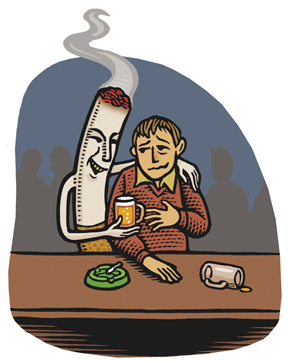 loading
loading
FindingsNo smoking? Less drinking.Alcohol misuse is reduced when states ban smoking in bars.  Gregory NemecView full imageSmoking bans in restaurants and bars may have an unintended consequence. A new Yale study shows people who live in states with bans are less likely to begin abusing alcohol and more likely to stop. Yale psychiatry professor Sherry McKee and coauthors looked at data on drinkers who drink in public places in two periods: before and after smoking bans were enacted in some states. In states that enacted smoking bans, they found 61 percent of people diagnosed with an alcohol use disorder in the first wave of the study reduced their drinking. In states without smoking bans, that number was about 50 percent. Seven percent of people in states with a smoking ban began misusing alcohol, less than the 11 percent in states without such bans. “Smoking and drinking are tightly linked,” and it is likely that they are mutually reinforcing, says McKee. The study, published in Drug and Alcohol Dependence, used data from the National Institutes of Health. It compared respondents who lived in eight states that enacted smoking bans during 2001–05 with respondents in states that didn’t enact bans. It was the first study to look at the impact of smoke-free policies on rates of alcohol use disorders. Twenty-nine states now have smoking bans in public places. The researchers hope the study will boost that number. “Our results [show] the public health benefits of smoking bans,” says Kelly Young-Wolff, a coauthor who is now a postdoc at Stanford.
The comment period has expired.
|
|